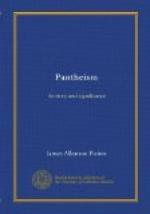[Footnote 6: “The gods of ocean, air and fire, and the judge of the lower regions respectively” (Rev. John Davies).]
[Footnote 7: The “Bhagavad Gita,” translated by the Rev. J. Davies, M.A.]
[Footnote 8: The Karma was not a soul. What it was is, according to our authorities, very difficult for the Western mind to conceive. But its practical effect was, that on the death of the imperfect man, another finite existence of some sort necessarily took his place. But this new finite existence was not the former man. It is only on the death of him who has attained Nirvana that Karma ceases to act, and no new finite existence takes his place.]
[Footnote 9: See Prof. W. Max Muller, on “Egypt,” in the Encyc. Biblica.]
[Footnote 10: “Capability of walking home without help,” is the limit quaintly fixed by the poet. To our modern feeling it seems rather wide. Yet, practically, it is the limit professedly observed by our publicans in serving their customers.]
[Footnote 11: Karsten, Xenophanis Reliquiae, p. 68 (Amsterdam, 1830). Both the paraphrase and occasional translations which I give are of course free; but I think the spirit and meaning are preserved.]
CHAPTER II
POST-CHRISTIAN PANTHEISM.
In speaking of Neo-Platonism I incidentally mentioned its apparent subjection to “extraneous influences,” These, of course, included the rising power of Christianity and its Jewish traditions.
[Sidenote: The Hebrew Tradition.]
Even before the advent of the new revelation, the Jewish settlements existing in all great cities of the Graeco-Roman world excited interest at any rate among sentimentalists touched by the fascination at that time beginning to be exerted by oriental religions. And this influence of Jewish traditions was much facilitated by the existence of a Greek translation of the Hebrew scriptures.
[Sidenote: Its Influence on Greek Philosophy.]
[Sidenote: To Inspire Devotion, Not Solve Problems.]
Now, what the Hebrew tradition did for Greek philosophy was, of course, not to favour its Pantheistic trend, where that existed, but much more to convert such semi-Pantheism from a mere intellectual speculation to contemplative devotion. For Hebraism itself had become almost as intensely monotheistic as the later Islam. And, though monotheism may be a stage in the progress of religion from Animism to Pantheism, it may, also, by the peculiar intensity of the personal devotion it sometimes inspires, cause the very idea of any farther expansion of faith to be counted a sin.
[Sidenote: Philo, the Jew of Alexandria.]
Perhaps the influence of Hebraism on Hellenism may be illustrated by the Alexandrian Philo’s pathetic endeavour not only to trace the wisdom of the Greeks to Moses, but to show that this derived lore is much mightier for good when re-invested with the spiritual power and ardent devotion of the Jewish faith.




